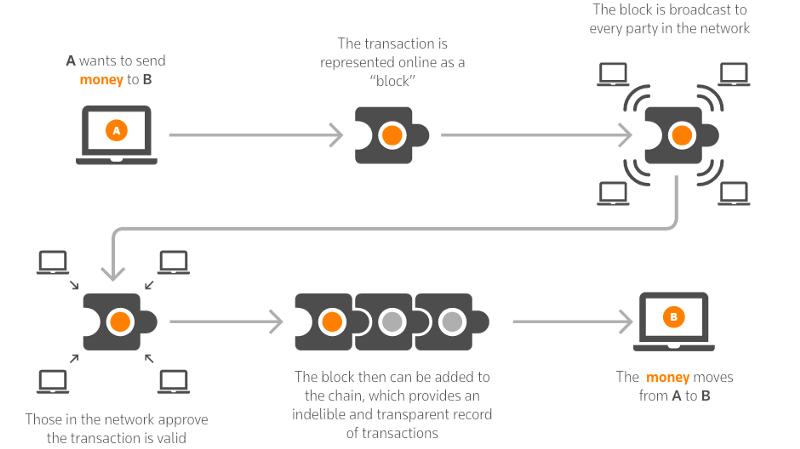Corey Harnish investigates how new technologies – specifically blockchain – could help the not-for-profit sector create greater impact.
Have you heard of 'blockchain'? If not, I'm sure you've heard of its most famous application, Bitcoin? Regardless, this technology is already being used to create real social impact. There’s this exciting movement going on known as 'Blockchain for Humanity' or 'Blockchain for Social Impact'.
Communities of amazing people, who want to make this world better, solve real global problems, and create an impact, are developing ways to leverage blockchain technology for humanitarian and community causes. By no means am I an expert, yet as a not-for-profit professional, I feel it's my duty to share the little I know. Hopefully, by the end of this read, I will have enlightened, at worst, intrigued you.
So, what does Blockchain for Humanity actually mean?
First off, blockchain is a technology that enables the decentralization of governance; a way to create a system of transactions where information is transparent, just, and agreed upon by all. How blockchain technology will be deployed globally is still work in progress.
Many start-ups, and now big financial institutions and technology companies are vying for leadership roles. As with other paradigm shifts (think the internet, the Cloud), it will take time before the underlying technology and overarching benefits will be in place, but the impact will be profound.
New kid on the block: blockchain technology explained
For example, traditionally, we have a third party that regulates our transactions. For instance, a bank that holds and transfers our money, or a central government that calculates our votes, right? Well, say “no more.” Blockchain removes this arguably unnecessary 'middle man', which lowers costs, increases efficiency, and creates complete transparency, i.e. removes any potential corruption.
Sounds great, but how does it assist with social impact?
Well, let me ask you this: Do you know of any not-for-profits that make you raise an eyebrow? The ones where you ask yourself, “Are they really spending the money as they claim to be?” I bet of at least one that comes to mind. Now, with blockchain, say goodbye to raised eyebrows. Everything is transparent.
”Blockchain is a technology that enables the decentralization of governance; a way to create a system of transactions where information is transparent, just, and agreed upon by all.”
Imagine being able to track how each and every dollar is used in a not-for-profit. Or knowing how your donation to a refugee fund is actually being used. Blockchain is a way that we can ensure donations get to their intended audience. With complete transparency, trust, and accountability, donors will be able to see where their donations go, how they are being used within the organization, and, essentially the impact it is having.

Chain reaction: here's how money can be sent through blockchain
Besides transparency of donations, it can play a huge role in governance. How many times have you heard about a rigged election? Many times, right? Blockchain can stop this! As a decentralized system, all parties need to approve ledgers, and there is accountability for every transaction so no one can change/delete information.
Okay, sounds interesting. So has blockchain been successful?
Yes! There literally are hundreds of communities already established that are working on using blockchain for social impact. Here are a few of my favorite stories:
-
Ripple (XRP) donated $29 million to DonorsChoose.org, a platform that funds projects for American teachers and classroom.
-
In 2017 UN Women partnered with Innovation Norway to host a blockchain hackathon in which numerous decentralized applications utilizing blockchain were created.
-
UNICEF recruited gamers to mine Ethereum in aid of Syrian refugees.
Awesome! Any cool blockchain organizations to recommend?
Indeed, check out these three organizations that are making great strides.
1. Consensys
Builds decentralized applications and various developer and end-user tools for blockchain ecosystems, primarily focused on Ethereum. Consensys is an impact hub that is leveraging its network to help build successful companies that intend to make a social impact.
2. Giveth.io
Building the future of giving. Like Kickstarter or GoFundMe, Giveth is a crowdfunding platform for charitable giving. However, it cuts out bureaucracy and enables not-for-profits to create a high level of transparency and accountability towards givers. Not-for-profits can share what they want to raise funds for, how much they need, and what result this will allow them to achieve, while givers can see exactly how their funds are used and even allocate their donation to a particular budget item.
3. Level One Project
An initiative of the Bill & Melinda Gates Foundation, Level One Project intends to help “level the playing field” by building one digital financial system in every country around the world. Level One has launched Mojaloop, an open-source payment platform designed for people who lack access to usual payment services.
“Blockchain removes this arguably unnecessary 'middle man', which lowers costs, increases efficiency, and creates complete transparency, i.e. removes any potential corruption.”
I’m a not-for-profit professional, how can I get involved?
Start learning now! Blockchain technology is still in its early-development stage, so there's still a lot to learn and understand about how to use blockchain, especially for not-for-profits. Begin by gaining a better understanding of how your organization might be able to use it. Here’s a few things you can do:
- Check out Charities Aid Foundation’s Blockchain Resources
- Read up on what GuideStar.org has to say about bitcoin for competitive advantage
- Share your ideas! Let me know what you’re thinking and let’s brainstorm next steps
You could create an ICO (Initial Coin Offering) for your organization, use a blockchain fundraising platform to gain donations, or maybe get supporters to mine Ethereum for you. The sky really is the limit with blockchain. ●
This article from Corey Harnish was originally posted on Linkedin.
Written by Corey Harnish
 The poster child of community, Corey is a great listener and huge believer in humanity. Currently the CEO of Better World International a 501c3 tech nonprofit, Corey is leading The Good Cards development; an innovative online-gaming platform and app that engages people worldwide in doing good deeds for happiness and global sustainability.
The poster child of community, Corey is a great listener and huge believer in humanity. Currently the CEO of Better World International a 501c3 tech nonprofit, Corey is leading The Good Cards development; an innovative online-gaming platform and app that engages people worldwide in doing good deeds for happiness and global sustainability.
Corey is an AmeriCorps VISTA Alumni, an Honorary Rotarian of Rotary International, as well as a volunteer of Defy Ventures, providing business coaching to EITs (entrepreneurs-in-training), and an active personal life coach. Corey empowers individuals and communities and help them to flourish through personal development coaching and community service involvement.
An aspiring Social Justice activist with a passion for community/sustainable development, service learning, juvenile justice rehabilitation, and brain-based coaching.
Join the conversation
You are posting as a guest. If you have an account, sign in now to post with your account.